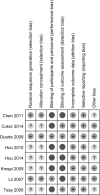Do psychological interventions reduce depression in hemodialysis patients?: A meta-analysis of randomized controlled trials following PRISMA
- PMID: 27559971
- PMCID: PMC5400338
- DOI: 10.1097/MD.0000000000004675
Do psychological interventions reduce depression in hemodialysis patients?: A meta-analysis of randomized controlled trials following PRISMA
Abstract
Background: Depression is highly prevalent in hemodialysis patients and results in poor patient outcomes. Although psychological interventions are being developed and used for these patients, there is uncertainty regarding the effectiveness of these interventions. The purpose of this meta-analysis is to evaluate the effects of psychological interventions on depression treatment in hemodialysis patients.
Methods: All randomized controlled trials (RCTs) relevant to the depression treatment of hemodialysis patients through psychological interventions were retrieved from the following databases: Embase, Pubmed, PsycINFO, the Cochrane Database of Systematic Reviews, and the Cochrane Central Register of Controlled Trials. The reference lists of identified RCTs were also screened. The Cochrane risk of bias tool was used to evaluate the quality of the studies, RevMan (5.3) was used to analyze the data, and the evidence quality of the combined results was evaluated using GRADE (3.6.1).
Results: Eight RCTs were included. The combined results showed that psychological interventions significantly reduced the scores of the Beck Depression Inventory (P<0.001) and interdialysis weight gain (P<0.001). However, due to the high heterogeneity, effect size combinations of sleep quality and quality of life were not performed.
Conclusion: Psychological interventions may reduce the degree of depression and improve fluid intake restriction adherence. More rigorously designed research is needed.
Conflict of interest statement
The authors have no conflicts of interest to disclose.
Figures








References
-
- Bayoumi M, Al Harbi A, Al Suwaida A, et al. Predictors of quality of life in hemodialysis patients. Saudi J Kidney Dis Transpl 2013; 24:254–259. - PubMed
-
- USRDS. Annual Report: Atlas of End-stage Renal Disease in the United States. Bethesda, MD: National Institutes of Health, National Institute of Diabetes and Digestive and Kidney Diseases; 2012.
-
- Palmer S, Vecchio M, Craig JC, et al. Prevalence of depression in chronic kidney disease: systematic review and meta-analysis of observational studies. Kidney Int 2013; 84:179–191. - PubMed
-
- Afsar B, Akman B. Depression and nonadherence are closely related in dialysis patients. Kidney Int 2009; 76:679–680. - PubMed
-
- Hong L. The investigation about influence factors to 261 cases of hemodialysis patient compliance. Zhongguo Xiandai Yaowu Yingyong 2009; 3:170–171.
Publication types
MeSH terms
Substances
LinkOut - more resources
Full Text Sources
Other Literature Sources
Medical

